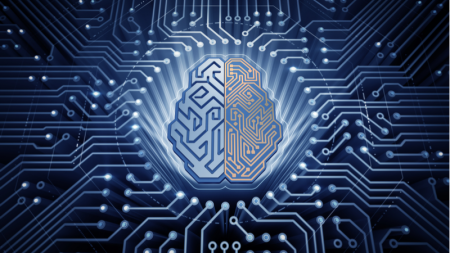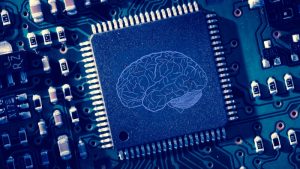Since blockchain first appeared in 2009 as the digital ledger for Bitcoin cryptocurrency transactions, it has steadily taken the online world by storm, in the process practically becoming a synonym for security. Even if a lot of people still don’t know what it is, they’re beginning to hear it more and more. IBM, for instance, has taken to mentioning “blockchain for security” in its TV ads. And in a sure sign of pending mainstream acceptance, a “Blockchain for Dummies” book is now available. […]
In a move to help Federal agencies streamline and modernize their technology infrastructure, President Trump signed the Modernizing Government Technology (MGT) Act into law today. […]
In light of recent advances in performance–not to mention the history of computing–it’s reasonable to assume that artificial intelligence and machine learning systems will become smarter and faster. But government-funded research that is being put into practice at the Air Force Research Laboratory (AFRL) could achieve new levels of performance while also consuming minimal amounts of power. […]
In the seven years since it was launched, the General Services Administration’s (GSA) Challenge.gov platform has demonstrated that crowdsourcing can be a winning approach to problem solving in government. […]
Department of Defense (DoD) officials have been framing Artificial Intelligence (AI) as the center of a “new space race,” citing its growing importance in military and geopolitical operations, the investments other countries such as China have been making in AI, and Russian President Vladimir Putin’s assertion that whoever takes the lead in this field will be “ruler of the world.” […]
The Defense Department (DoD) is leading the brain-computer interface charge within government, recently investing $65 million across six projects. Each of these projects will work to develop high-resolution neural interfaces and working systems that could help in sensory restoration, specifically in these projects with regard to sight and speech. The contractors–five research organizations and one private company–will work under the Defense Advanced Research Project Agency’s (DARPA) Neural Engineering System Design (NESD) program, which was launched in 2016 with the goal of developing an implantable neural interface able to deliver high-bandwidth data transfers between the brain and electronics systems. […]
The National Institute of Standard and Technology (NIST) released the second draft of the proposed update to its Framework for Improving Critical Infrastructure Cybersecurity. The new draft aims to clarify, refine, and enhance the framework as well as “amplifying its value and making it easier to use,” NIST officials said. […]
As the Principal Deputy Director of National Intelligence, Sue Gordon has no shortage of cybersecurity data at her fingertips, but the key to cyber success is connecting the dots cross-government and in partnership with the private sector. […]
With rapid growth in smart devices, exploding data volumes, and the shift to the cloud, it is becoming more and more challenging to protect critical systems and information. Government and industry leaders convened at the Symantec Government Symposium in Washington, D.C. on Tuesday to discuss these complex challenges and the solutions needed to address them. […]
The Army is forging ahead with deployment of its Big Data Platform (BDP), a move that underscores the Department of Defense’s (DoD) plans for using open-source software, commercial technologies, and cloud services to get a grip on the data it collects from a wide range of sources. […]
The Centers for Medicare and Medicaid Services (CMS) need to more fully align its antifraud efforts with the Government Accountability Office’s (GAO) Fraud Risk Framework, GAO auditors said in a report released Dec. 5. CMS’s anti-fraud programs currently align only partially with the risk framework, GAO’s investigation revealed. […]
SBA has made it a priority to provide cybersecurity assistance for small businesses, reaching out to local chambers of commerce, technology vendors, and banks that serve small businesses to raise awareness of the benefits of cybersecurity threat prevention sharing through conferences. […]
After years of fits and starts on a much-needed electronic filing system, the Justice Department’s Executive Office for Immigration Review (EOIR) is “poised” to deploy a comprehensive, cloud-based e-file platform next year to help reduce a massive backlog of cases, a top EOIR official said recently. […]
Artificial intelligence (AI) systems are getting awfully good at the Who, What, When, Where and even How for a variety of jobs, from military operations to financial transactions to medical diagnosis and treatment. But the Why is another story. […]
With the midterm elections of 2018 fewer than 12 months away, Congress is showing heightened concern over the potential for disastrous cyber attacks on the nation’s electronic voting systems. […]
Two House panels investigating the Equifax Inc. data breach are zeroing in on “technical and process” failures that led to the loss of personally identifiable information, including Social Security numbers, belonging to more than 145 million Americans, according to recently released documents. […]
Secretary of State Rex Tillerson spoke frankly about the need IT modernization in the State Department last week, both referencing his personal experiences with the department’s servers and tying it into a larger need for reorganization in the department, but failing to lay out any concrete plan for the changes. […]
For enterprise IT teams seeking ways to deliver on-premises IT services with the speed and operational efficiency of public cloud services, the General Services Administration (GSA) announced the availability of the Nutanix’s Hyperconverged Cloud Infrastructure (HCI) platform to agencies. […]
Pandemic threats such as Ebola, Zika, and avian flu are not only a danger to public health, but are also viewed as potential national security threats, as the National Intelligence Council, an arm of the Director of National Intelligence, points out in its 2017 report, Global Trends: Paradox of Progress. […]
The recently launched General Services Administration (GSA) SmartPay Travel Card app is designed to take some of the worry out of official government travel, GSA officials said. […]
For military analysts struggling to make proper use of millions of hours of full-motion video from drones, the cavalry will begin arriving this month, in the form of computer vision algorithms developed under the Department of Defense’s (DoD) Project Maven. […]
The Army and Navy recently announced that their Cyber Mission Teams were fully operational, and the U.S. Cyber Command now has all of their planned complement of 133 teams in business. With its people (totaling more than 6,000 service members and civilians) in place, U.S. cyber forces can now look to machines to help carry out effective operations in the cyber domain. […]
The Department of Defense (DoD) is cooking up big plans for blockchain technology, the digital ledger best known for its support of cryptocurrencies such as Bitcoin and Ethereum. The technology’s decentralized, encrypted approach holds promise for a variety of secure functions in addition to financial transactions, from cyber defense and distributed communications to protecting the digital supply chains used by deployed forces for 3D printing. A Navy officer on the Naval Innovation Advisory Council has written that blockchain could “revolutionize” the way military operations over the next decade. […]
How far can we push the limits of computing power? That is a question that scientists at the National Institute of Technology and Standards (NIST) are pondering. […]
Amazon Web Services’ (AWS) re:Invent conference achieved the impossible dream: 700 public sector technology professionals awake at 7 a.m. in Las Vegas. At the public sector keynote, Teresa Carlson, VP worldwide public sector AWS, highlighted the new AWS Secret Region. The Secret Region was designed for the U.S. intelligence community (IC) and can operate workloads up to the Secret U.S. security classification level. […]
The Department of Veterans Affairs (VA) is piloting a new telehealth program that uses tablets and the cloud to help veterans recover faster than before. The new program is specifically targeting non-healing wounds, which costs the U.S. $50 billion per year in healthcare expenses. […]
A team at the Georgia Institute of Technology, backed by the Defense Department’s research arm, is developing tool that will give cybersecurity investigators that kind of look at a cyber intrusion, quickly providing layers of detail not currently available, in what researchers say is the first instance of automated forensics. […]
The Federal CIO Council recently released a case study focusing on Technology Business Management (TBM) adoption rates at a single bureau within the Department of Justice (DOJ). The study will be used as part of the council’s commitment to guide agency-wide adoption of TBM. […]
As Feds get smarter about Artificial Intelligence on the cyber frontier, seems agencies’ IT defenders are suffering from schizophrenia about cyber cyborgs. That’s the topline takeaway from the new MeriTalk “Federal Cyber AI IQ Test” study. […]
The FBI currently has a backlog of nearly 7,000 crime-connected phones that its experts are unable to crack. And it’s going to get much worse, law enforcement leaders say. […]





























